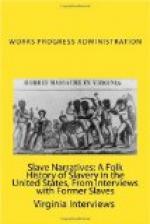“Mr. Davidson was very good to his slaves, treating them with every consideration that he could, with the exception of freeing them; but Mrs. Davidson was hard on all the slaves, whenever she had the opportunity, driving them at full speed when working, giving different food of a coarser grade and not much of it. She was the daughter of one of the Revells of the county, a family whose reputation was known all over Maryland for their brutality with their slaves.
“Mother with the consent of Mr. Davidson, married George Berry, a free colored man of Annapolis with the proviso that he was to purchase mother within three years after marriage for $750 dollars and if any children were born they were to go with her. My father was a carpenter by trade, his services were much in demand. This gave him an opportunity to save money. Father often told me that he could save more than half of his income. He had plenty of work, doing repair and building, both for the white people and free colored people. Father paid Mr. Davidson for mother on the partial payment plan. He had paid up all but $40 on mother’s account, when by accident Mr. Davidson was shot while ducking on the South River by one of the duck hunters, dying instantly.
“Mrs. Davidson assumed full control of the farm and the slaves. When father wanted to pay off the balance due, $40.00, Mrs. Davidson refused to accept it, thus mother and I were to remain in slavery. Being a free man father had the privilege to go where he wanted to, provided he was endorsed by a white man who was known to the people and sheriffs, constables and officials of public conveyances. By bribery of the sheriff of Anne Arundel County father was given a passage to Baltimore for mother and me. On arriving in Baltimore, mother, father and I went to a white family on Ross Street—now Druid Hill Ave., where we were sheltered by the occupants, who were ardent supporters of the Underground Railroad.
“A reward of $50.00 each was offered for my father, mother and me, one by Mrs. Davidson and the other by the Sheriff of Anne Arundel County. At this time the Hookstown Road was one of the main turnpikes into Baltimore. A Mr. Coleman whose brother-in-law lived in Pennsylvania, used a large covered wagon to transport merchandise from Baltimore to different villages along the turnpike to Hanover, Pa., where he lived. Mother and father and I were concealed in a large wagon drawn, by six horses. On our way to Pennsylvania, we never alighted on the ground in any community or close to any settlement, fearful of being apprehended by people who were always looking for rewards.




